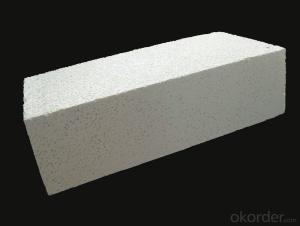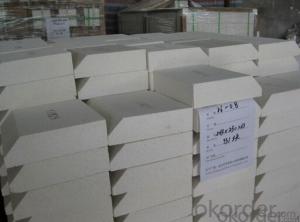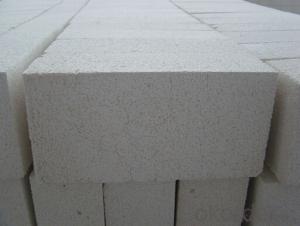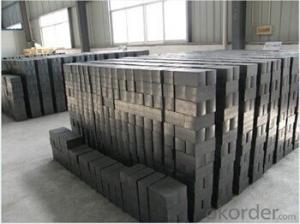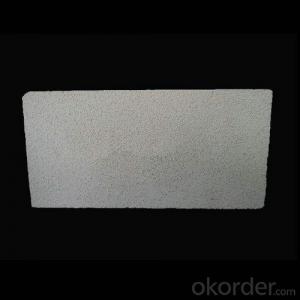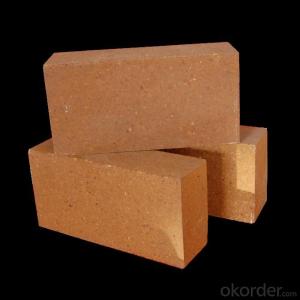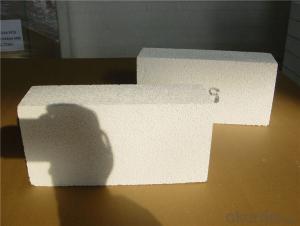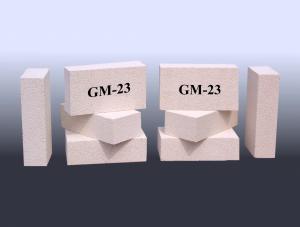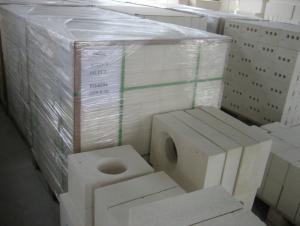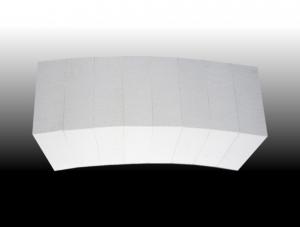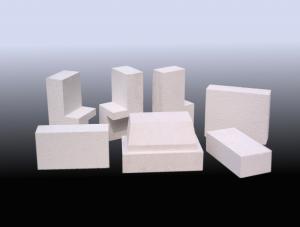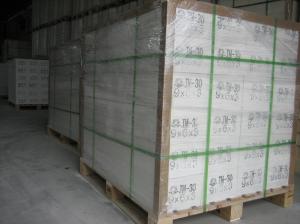Refractory Mullite Insulating Fire Brick JM 30
- Loading Port:
- Shanghai
- Payment Terms:
- TT OR LC
- Min Order Qty:
- 5000 kg
- Supply Capability:
- 100000 kg/month
OKorder Service Pledge
OKorder Financial Service
You Might Also Like
Top insulation ceramic fiber blanket
General information of ceramic fiber blanket
Cmax ceramic fiber blanket is made of high quality kaolin clay, centrifugal high purity alumina and silica or blowing process. It's no asbestos. Double side acupuncture for easy installation provides a lot of tension or strength of the blanket.
Products are divided into standard, high pressure, HA and Hz, respectively, corresponding to the highest service temperature of 1000, 1100, 1200, and 1350
Characteristics of ceramic fiber blanket
Heat resistance
Light weight
Low thermal conductivity
Low heat storage
Thermal shock toughness
High tensile strength
Application of ceramic fiber blanket
Refractory fiber lining for petrochemical process heating furnace
Heat treatment furnace or intermittent (shuttle) kiln heat surface lining
General oven standby insulation
Heat sealing or kiln kiln car door
Electrical insulation
Ceramic fiber blanket
Common problem solutions
1. What products do you have?
We have all kinds of refractory bricks, refractory casting materials, mortar, cement, ceramic fiber products, etc..
Or you can browse our products to choose what you need.
2. How to control product quality?
With strict quality control system throughout the material selection and production process, we have the quality of refractory materials and ceramic fiber products to meet customer requirements.
From the selection of raw materials, the quality of our control to start. The quality certificate of the raw material is required, each batch of the products are to be tested in the use of the forward line. In the production process, the quality control by the workers, and then each piece of classification, and through the quality supervision and inspection.
3. Can you give me a brief introduction to the application of your product?
My company is mainly engaged in refractories in the steel, cement, glass, ceramics, petrochemical, electric power and other industries.
4. What information do you need if I need you?
In order to select the right products, we will provide us with information, such as the United States, technical data, order quantity, product application, etc..
If you have any questions, please contact us.
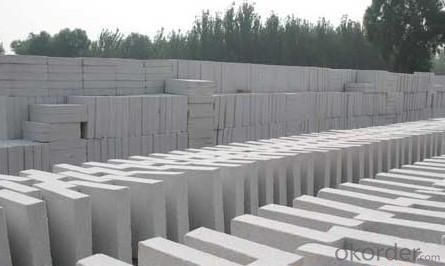
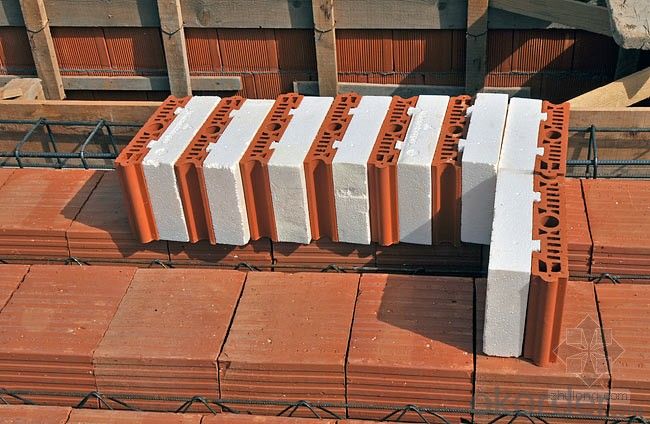
FAQ
1. Which products do you have?
We have all kinds of refractory brick, castable, mortar, cement, ceramic fiber products, etc.
Or you could browse our products to choose what you need.
2. How do you control the products quality?
With strict quality control system throughout the materials selection and production process, our refractory and ceramic fiber products quality is effectively controlled to meet customer requirements.
From the raw materials selecting, our quality control begin. The quality certificates of raw materials are required and each batch will be tested before using. During production, the quality control are conducted by workers and then each piece will be sorted and examined by quality supervise.
3. Can you give me a brief introduction of the application of your products?
We are mainly specializing in the refractory materials in iron and steel, cement, glass, ceramics, petrochemical, electric power Industry, etc.
4. If I need your offer, what information do you need?
In order to choose suitable products, it will be appreciated to provide us the information, such us specification, technical data, order quantity, products application etc.
If any question, please contact us freely.
- Q:Are insulating fire bricks suitable for applications with high mechanical stress?
- No, insulating fire bricks are not suitable for applications with high mechanical stress. They are designed to provide thermal insulation rather than mechanical strength, so they may crack or break under high mechanical stress.
- Q:Are insulating fire bricks fire-rated?
- Yes, insulating fire bricks are fire-rated. They are specially designed to withstand high temperatures and provide excellent insulation properties, making them suitable for use in fireplaces, kilns, and other applications that involve exposure to extreme heat.
- Q:Can insulating fire bricks be used for insulation in power boiler walls?
- Yes, insulating fire bricks can be used for insulation in power boiler walls. Insulating fire bricks are designed to provide excellent thermal insulation, high temperature resistance, and low thermal conductivity. These properties make them suitable for use in power boiler walls, where insulation is crucial to reduce heat loss and improve energy efficiency.
- Q:Can insulating fire bricks be used in the construction of furnaces?
- Yes, insulating fire bricks can be used in the construction of furnaces. Insulating fire bricks are specially designed bricks that have high insulating properties, allowing them to withstand high temperatures while minimizing heat loss. These bricks are made from lightweight materials such as clay, silica, and alumina. They have a low thermal conductivity, which means they can effectively maintain heat within the furnace while preventing the outer surface from becoming too hot. This makes them ideal for lining the walls, roof, and floor of furnaces, helping to increase energy efficiency and reduce fuel consumption. Additionally, insulating fire bricks are resistant to thermal shock, making them highly durable and long-lasting in the harsh conditions of a furnace. Overall, insulating fire bricks are a popular choice for furnace construction due to their excellent insulating properties and ability to withstand high temperatures.
- Q:Can insulating fire bricks be used in cement plants?
- Yes, insulating fire bricks can be used in cement plants. Insulating fire bricks are designed to withstand high temperatures and are commonly used in industries that require thermal insulation. In cement plants, they can be used in various applications such as lining kilns, furnaces, and other high-temperature equipment. These bricks help in reducing heat loss, improving energy efficiency, and ensuring consistent and controlled temperatures in the cement production process. Additionally, insulating fire bricks are lightweight and have low thermal conductivity, making them an ideal choice for insulating applications in cement plants.
- Q:Can insulating fire bricks be used in high-temperature insulation for aerospace applications?
- Insulating fire bricks are capable of being utilized for high-temperature insulation in aerospace applications. Constructed from lightweight refractory materials possessing exceptional insulating properties, these bricks can endure extreme temperatures. The bricks possess a low thermal conductivity, effectively decreasing heat transfer and maintaining the desired temperature within aerospace components. Within the realm of aerospace applications, environments of elevated temperatures are commonly encountered, such as within rocket engines, exhaust systems, and thermal protection systems. Insulating fire bricks can be employed in these applications to furnish thermal insulation, shielding delicate components from excessive heat and averting heat loss to the surroundings. Furthermore, insulating fire bricks are renowned for their exceptional resistance to thermal shock, thereby enabling them to endure sudden temperature changes without cracking or deteriorating. This attribute is of utmost importance in aerospace applications, where components undergo substantial temperature variations during launch, re-entry, or other operational phases. Moreover, insulating fire bricks possess lightweight characteristics, which can prove advantageous in aerospace applications where weight reduction is crucial for fuel efficiency and overall performance. By implementing insulating fire bricks, aerospace engineers can achieve efficient thermal insulation while minimizing the added weight to the system. All in all, insulating fire bricks constitute a viable solution for high-temperature insulation in aerospace applications. Their exceptional insulating properties, resistance to thermal shock, and lightweight nature render them suitable for safeguarding critical aerospace components within environments of extreme temperatures.
- Q:What is the bulk density of insulating bricks?
- Stoneware porcelain water absorption rate is greater than 0.5% and less than or equal to 3%; fine stoneware bibulous rate is greater than 3% and less than or equal to 6%; brick bibulous rate is greater than 6% and less than or equal to 10%; pottery tile water absorption rate is greater than 10%. The water absorption rate of expression: ceramic brick brick >6% = >10% = >3% = fine stoneware porcelain stoneware or porcelain >0.5%
- Q:Can insulating fire bricks be used in refractory lining applications?
- Yes, insulating fire bricks can be used in refractory lining applications. Insulating fire bricks are made from lightweight materials that have high insulating properties, such as clay or silica. These bricks are designed to provide excellent thermal insulation, reducing heat loss and improving energy efficiency in high-temperature applications. In refractory lining applications, insulating fire bricks are commonly used to line the walls, floors, and roofs of furnaces, boilers, kilns, and other industrial equipment. They are effective in preventing heat transfer to the surrounding environment and maintaining the desired temperature inside the equipment. Insulating fire bricks are also resistant to thermal shock, meaning they can withstand rapid changes in temperature without cracking or failing. This makes them suitable for applications where the equipment goes through frequent heating and cooling cycles. Furthermore, insulating fire bricks have low thermal conductivity, which means they can effectively limit heat transfer between different areas of the refractory lining. This helps to prevent hot spots and temperature imbalances, ensuring uniform heat distribution throughout the equipment. Overall, insulating fire bricks are a versatile and effective choice for refractory lining applications, providing excellent thermal insulation, resistance to thermal shock, and uniform heat distribution.
- Q:Are insulating fire bricks suitable for use in the construction of smelters?
- Yes, insulating fire bricks are suitable for use in the construction of smelters. These bricks are designed to withstand high temperatures and provide excellent insulation properties, making them ideal for lining the walls and floors of smelters. They help to retain heat, reduce energy loss, and protect the structure from extreme heat. Additionally, insulating fire bricks are lightweight and easy to install, making them a preferred choice for smelter construction.
- Q:Can insulating fire bricks be used in the construction of hot blast stoves?
- Indeed, it is possible to utilize insulating fire bricks in the fabrication of hot blast stoves. These bricks are specifically engineered to possess a low thermal conductivity, rendering them highly efficient in diminishing heat dissipation. In order to ensure optimal functionality, hot blast stoves necessitate the maintenance of elevated temperatures, a goal that can be accomplished through the utilization of insulating fire bricks, which effectively restrict heat transfer to the stove's external surface. Furthermore, these bricks exhibit commendable insulation properties, enabling energy conservation and enhancing the overall efficiency of the stove. Moreover, it is worth noting that insulating fire bricks are resistant to thermal shock, a crucial attribute in hot blast stove applications where frequent temperature fluctuations are common.
1. Manufacturer Overview |
|
|---|---|
| Location | |
| Year Established | |
| Annual Output Value | |
| Main Markets | |
| Company Certifications | |
2. Manufacturer Certificates |
|
|---|---|
| a) Certification Name | |
| Range | |
| Reference | |
| Validity Period | |
3. Manufacturer Capability |
|
|---|---|
| a)Trade Capacity | |
| Nearest Port | |
| Export Percentage | |
| No.of Employees in Trade Department | |
| Language Spoken: | |
| b)Factory Information | |
| Factory Size: | |
| No. of Production Lines | |
| Contract Manufacturing | |
| Product Price Range | |
Send your message to us
Refractory Mullite Insulating Fire Brick JM 30
- Loading Port:
- Shanghai
- Payment Terms:
- TT OR LC
- Min Order Qty:
- 5000 kg
- Supply Capability:
- 100000 kg/month
OKorder Service Pledge
OKorder Financial Service
Similar products
New products
Hot products
Related keywords

